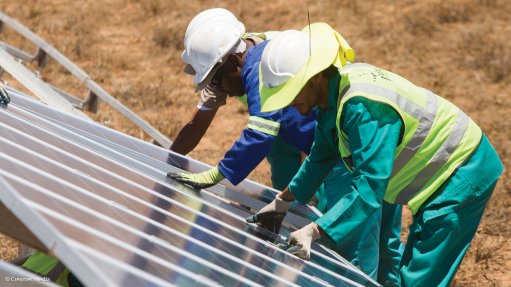South Africa must turn to renewables, Scatec GM emphasises
South Africa’s problem is one of a “fossil fuel dependency crisis”, rather than an “energy crisis”, renewable power producer Scatec sub-Saharan Africa GM Jan Fourie posits.
He says the country’s energy shortfalls, primarily driven by poor performance at an ageing fleet of coal-fired stations, are addressed in South Africa’s Integrated Resource Plan of 2019, which commits to a shift away from coal, with a proposed 25% of South Africa’s total power to come from renewables by 2030.
“The country’s abundant sunlight and wind resources make renewables the obvious panacea. Renewables-based projects are now quick to establish and fully cost-competitive with fossil-fuel-based ones.
“And with programmes like the Renewable Energy Independent Power Producer Procurement Programme (REIPPPP) and Risk Mitigation Independent Power Producer Procurement Programme (RMIPPPP) well under way, there is no shortage of investor backing or State support,” says Fourie.
Moreover, he notes that innovations in storage (battery) technology have allowed renewable energy plants to output completely stable, consistent, dispatchable power.
“The advent of these large-scale long-duration storage solutions, propelled by innovations in lithium-ion and other technologies, is finally dispelling the misconception that renewables’ output is intermittent, or that solar power is only available when the sun shines,” explains Fourie.
Scatec, which was announced as a preferred bidder under the RMIPPPP, is on track to add 150 MW of contracted capacity to the national grid through its hybrid solar and battery plants in the Northern Cape.
Fourie describes the project as ambitious, with one-million individual photovoltaic (PV) panels envisioned across a 1 100 ha area and a capital expenditure estimate of about $1-billion.
He says the plant’s lithium-ion battery units allow for a previously unprecedented level of output control and dispatchability.
“PV capacity is over-installed, and the vast excess of energy produced during the sunlight hours is stored in the battery packs, and released as needed, especially during the mornings and evenings when demand peaks, and grid operators request power. The storage units also safeguard against prolonged periods of overcast weather and seasonal swings,” Fourie notes.
He emphasises that these considerations are crucial as RMIPPPP guidelines stipulate that the new energy must be available from 05:30 to 21:00 every day, and dispatchable at the request of grid operators whenever market demand may arise.
Liquefied natural gas (LNG) has been mentioned as a viable alternative energy solution for South Africa; however, Fourie posits that renewables represent a far better strategy for an emerging economy.
“The significant challenges globally around decarbonisation, affordability and profitability suggest that the LNG industry may not enjoy popular backing from banks and investors for much longer,” he says.
With limited domestic production, the bulk of liquid gas burned in South Africa is imported, making the industry vulnerable to disruptions in international supply chains, as well as volatile exchange rates and commodity prices, Fourie explains.
“All these risks and vulnerabilities are passed through to the government and not borne by the independent power producer. Dispatchable renewables, which promise to deliver consistent power at a stable cost for the next 20 years, represent a far safer proposition for the State.
“Though LNG is less carbon-intensive than coal, it is still a fossil fuel. Its use has a detrimental impact on the environment, incurs a carbon tax and is not consistent with our goals to expand renewables’ contribution to South Africa’s energy mix. A greener future using renewables is possible, and is, in the longer term, a better strategy,” Fourie says.
Comments
Announcements
What's On
Subscribe to improve your user experience...
Option 1 (equivalent of R125 a month):
Receive a weekly copy of Creamer Media's Engineering News & Mining Weekly magazine
(print copy for those in South Africa and e-magazine for those outside of South Africa)
Receive daily email newsletters
Access to full search results
Access archive of magazine back copies
Access to Projects in Progress
Access to ONE Research Report of your choice in PDF format
Option 2 (equivalent of R375 a month):
All benefits from Option 1
PLUS
Access to Creamer Media's Research Channel Africa for ALL Research Reports, in PDF format, on various industrial and mining sectors
including Electricity; Water; Energy Transition; Hydrogen; Roads, Rail and Ports; Coal; Gold; Platinum; Battery Metals; etc.
Already a subscriber?
Forgotten your password?
Receive weekly copy of Creamer Media's Engineering News & Mining Weekly magazine (print copy for those in South Africa and e-magazine for those outside of South Africa)
➕
Recieve daily email newsletters
➕
Access to full search results
➕
Access archive of magazine back copies
➕
Access to Projects in Progress
➕
Access to ONE Research Report of your choice in PDF format
RESEARCH CHANNEL AFRICA
R4500 (equivalent of R375 a month)
SUBSCRIBEAll benefits from Option 1
➕
Access to Creamer Media's Research Channel Africa for ALL Research Reports on various industrial and mining sectors, in PDF format, including on:
Electricity
➕
Water
➕
Energy Transition
➕
Hydrogen
➕
Roads, Rail and Ports
➕
Coal
➕
Gold
➕
Platinum
➕
Battery Metals
➕
etc.
Receive all benefits from Option 1 or Option 2 delivered to numerous people at your company
➕
Multiple User names and Passwords for simultaneous log-ins
➕
Intranet integration access to all in your organisation

















